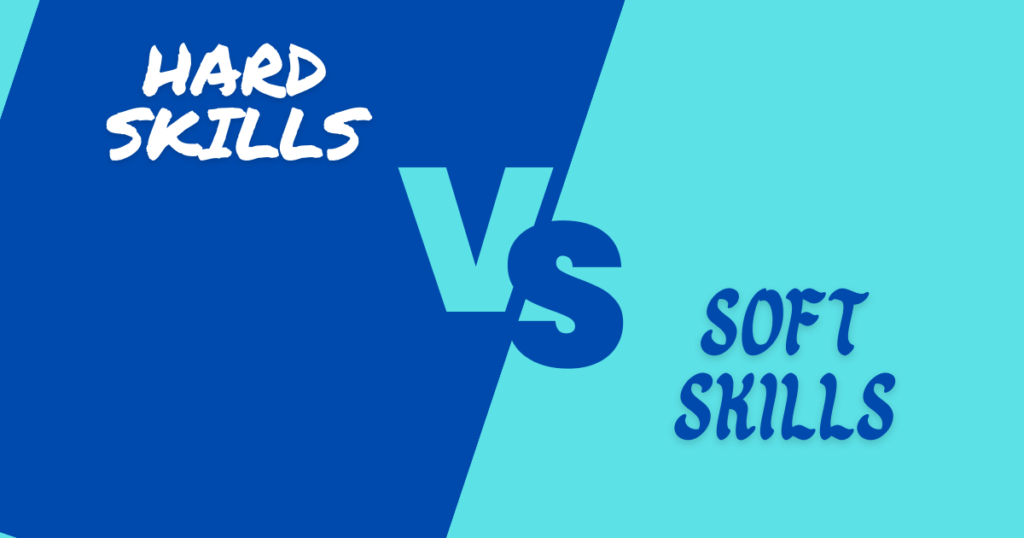Hard skills, also known as technical skills, are technical knowledge and teachable abilities and expertise that can be easily measured and quantified. Hard skills are often job-specific and can be acquired through education, training, or experience.
For example, a hard skill could be coding. No one is born with the knowledge to code. Preferably, it must be learned over time, normally through some type of schooling, education, relevant certifications, portfolios courses, skill assessment tests, upskilling or other skill development program.
By nature, hard skills are tangible and can be measured or tested. They are often specific to a particular job or industry and involve technical expertise or proficiency in a certain set of tools or methodologies. They are more concrete, measurable, demonstrate proficiency and objectively assessed.
While hard skills are crucial for specific jobs, they may not be easily transferable to different roles or industries without additional training or education.
Hard skills are gained through education or training that can be gained through any life experience, including in career or education. Typically, hard skills are learnt in the classroom, through books or other training materials, or on the job.
Table of Contents
Common Hard Skills
- Computer software knowledge
- User interface (UI) design
- Website development
- Content development
- Graphic design
- Data analysis
- Project management
- Marketing
- Copywriting
- Copyediting
- Budgeting
- Computer programming
- Foreign languages
- Search engine optimization (SEO)

Different hard skills will require different criteria for expertise.
Unequivocally hard skills will often be a prerequisite for a job. Again, look at the example of coding. This skill is very important if you are a developer or web designer. However, coding is less important if you are a plumber.
For some professions, like lawyers and doctors, one need advanced degrees and rigorous testing to prove their hard skills. On the other professions, like digital marketer or copywriters, one can learn the skills on their own or on the job and can prove hard skills with a portfolio of work.
While certain hard skills will be mandatory for many jobs, other hard skills might be negotiable.
Hard skills are technical skills required for a job.
Also, hard skills are important for resume, as employers look for them when hiring.
Some of the most in-demand hard skills include:
- Adobe software suite
- Bilingual or multilingual
- Database management
- Data mining
- Marketing management
- Mobile development
- Network security
- SEO/SEM marketing
- Statistical analysis
- User interface design
- Storage systems and management
- Programming languages
According to data published by LinkedIn, the top trending hard skills are:
Top Hard Skills
- Customer service
- Accounting
- Business development
- Marketing
- Digital marketing
- Finance
- Sales and marketing
- Financial analysis
- Engineering
- Social media marketing
- Structured query language (SQL)
Developing a diverse set of hard skills can significantly enhance one’s professional capabilities and one can be valuable asset in their chosen field.
Here are 10 examples of hard skills one can acquire:
- Proficiency in programming languages such as Python, Java, or C++ are excellent hard skills.
- Graphic design and multimedia production
- Project management skills show how one can effectively plan, execute, and monitor projects.
- Proficiency in specific software applications, like Microsoft Office Suite or Adobe Creative Cloud, is very important.
- Accounting and bookkeeping certifications
- Network administration and troubleshooting
- Engineering design and drafting abilities help you create technical drawings and plans.
- Digital marketing and search engine optimization (SEO)
- Data analysis and interpretation help you derive insights and make informed decisions.
- Statistical analysis and modelling allow you to analyse data and identify patterns.
Now that we have understood, the meaning of Hard Skills.
Let’s understand, the meaning of Soft Skills. How important will soft skills be in the future?
The answer to this question, is.
Very!
Deloitte Access Economics forecasts that soft skill-intensive occupations will account for two-thirds of all jobs by 2030.
Soft skills, also known as “people skills” or “interpersonal skills,” are subjective skills that are much harder to quantify. Soft skills, or people skills, are traits and abilities that one develops throughout their entire life. Soft skills speak to how and why one is motivated to do certain things.
Soft skills, also known as interpersonal, people, or social skills, are non-technical, personal attributes which are difficult to define or to measure.
These skills are subjective and less quantifiable. Soft skills reflect an individual’s emotional intelligence and social awareness. Flourishing these attributes enhances both professional and personal relationships.
Effective communication, is a key soft skill many employers look for.

Soft skills examples include:
- Communication: Expressing ideas, thoughts, and information through written, verbal, and non-verbal means such as body language.
- Empathy: Understanding and compassion for the feelings and perspectives of others.
- Teamwork: The capacity to work with others.
- Leadership: The skill to guide, motivate, and inspire others to achieve common goals.
- Problem-solving: The aptitude to analyse complex situations, identify issues, and give solutions.
- Dependability: Being reliable and consistent.
- Open-mindedness: Willingness to consider different perspectives and adapt to changing circumstances.
- Creativity: Demonstrating the ability to create new ideas, solutions and proceed towards problems.
- Critical thinking: The skill to analyse information, assess situations, and make well-informed decisions.
- Organization: Managing tasks, time, and
- Willingness to learn: Maintaining a proactive.
- Time management: Managing one’s time to enhance productivity.
- Conflict resolution: The capability to address and resolve conflicts.
Some more Soft skills include:
- Stress management
- Active listening
- Adaptability
- Integrity
- Flexibility
- Motivation
- Patience
- Persuasion
- Work ethic
Soft skills are essential to one’s career and as one search for jobs. Employers at times prefer to select candidates who have a stronger set of soft skills over hard skills.
For example, one may be seeking a job in customer care services but lack prior knowledge of data analysis tools. If one has references that can attest to the effectiveness of one’s soft skills, such as empathy, open-mindedness and communication, an employer may choose one over another candidate whose hard skills are stronger but who lacks the same level of soft skills.
Some of the most in-demand soft skills include:
- Integrity
- Dependability
- Effective communication
- Open-mindedness
- Teamwork
- Creativity
- Critical thinking
- Organization
- Willingness to learn
- Empathy
- Collaboration
- Adaptability
- Active listening
- Emotional intelligence
- Initiative
- Compassion
- Attention to detail.
- Problem-solving skills
- Positive attitude
Soft skills, however, are more interpersonal than technical. They are sometimes known as durable skills.
Soft skills are typically something that one is naturally good at, without having to learn it through education or hands-on training. However, one can still improve soft skills, just as one can improve your hard skills, like;
- Maintaining eye contact (active listening)
- Speaking clearly when prompted (effective communication)
- Asking follow-up questions (active listening)
Soft skills are deeply linked to an individual’s personality. Also known as interpersonal or people skills, soft skills are personal attributes and qualities that affect how individuals interact with others.
Soft skills are intangible in nature and are transferable across different roles and industries. They are valuable in a variety of contexts and contribute to an individual’s overall effectiveness.
Soft skills are often developed over time through experiences, interactions, and self-awareness. They can be honed through practice and feedback.
Soft Skills can be gained through the informal learning process, for example, one can learn etiquettes and table manners, by associating with people, attending social get together and parties.
These are acquired, but these cannot be measured.
Soft Skills helps in maintaining interpersonal relations, plays a crucial role in effective decision making, improves communication skills and facilitates professional development and career growth.
Hard skills or soft skills. Which is more important ?
Trick question!
To be successful in any role, one need a combination of relevant hard skills and soft skills.
And that is why it is important to have both hard and soft skills.
Hard and soft skills are both crucial for personal and professional success. They play distinct role yet complementary. A balance between hard and soft skills is essential for success.
Combining hard skills with soft skills creates well-rounded professionals. It allows them to excel in their roles.
A blend of hard and soft skills allows individuals to adapt to changing situations.
There is no one-size-fits-all ratio for hard skills to soft skills, as it heavily depends on the industry, job role, and individual career goals.
Different professions and roles have varying requirements for technical expertise and interpersonal abilities. However, there are some general perspectives:
Technical Roles:
Occupations in science, technology, engineering, and mathematics (STEM) fields often require a higher ratio of hard skills. For example, software developers, engineers, and data scientists may need a significant amount of technical proficiency.
The ratio in these roles could be skewed more toward hard skills, such as 70% hard skills and 30% soft skills.
Client-Facing Roles:
Jobs that involve frequent interaction with clients or customers, such as sales or customer service, often require a more balanced ratio. Soft skills like communication, empathy, and relationship-building become crucial.
In client-facing roles, the ratio might be closer to 50% hard skills and 50% soft skills.
Leadership and Management:
As individuals progress into leadership and management positions, the importance of soft skills increases. Leadership roles require effective communication, emotional intelligence, and the ability to motivate and inspire a team.
In leadership positions, the ratio might shift to 60-70% soft skills and 30-40% hard skills.
Creative and Design Fields:
Careers in creative fields, such as graphic design or content creation, often place a premium on creativity, innovation, and artistic abilities.
The ratio in creative fields might be more balanced, with perhaps 60-70% soft skills and 30-40% hard skills.
Conclusion
It’s crucial to note that these ratios are illustrative and not prescriptive. The ideal balance can vary based on individual strengths, career aspirations, and the specific requirements of a given role. In today’s dynamic work environment, possessing a combination of both hard and soft skills is generally advantageous, as it allows individuals to adapt to changing circumstances and contribute effectively in diverse professional settings.
As you move ahead in the journey of your skills, the career path also plays an important role.
Grab the book for creating your own career path.
Learn The Secrets Of Getting A Successful Career In Easy Steps:
How to Choose Your Career Path”- A self-Guided Book Just For You.
The eBook and the paperback version are available just a click away. https://www.amazon.in/dp/


